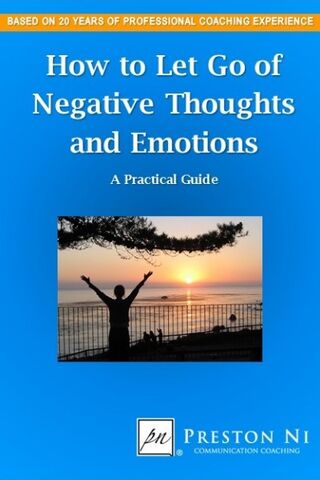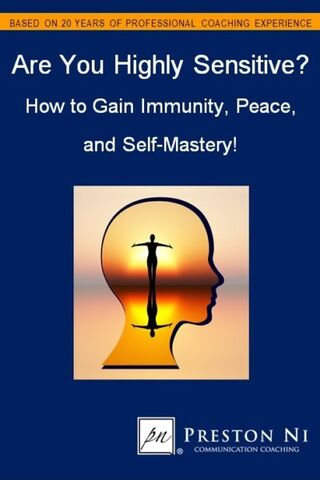Jealousy
How to Stop Comparing Yourself to Others—and Feel Happier!
How to Stop Comparing Yourself to Others—and Feel Happier!
Posted September 21, 2014

Author's Note: The following is an excerpt from the book (click on title): “How to Let Go of Negative Thoughts & Emotions – A Practical Guide."
"I generally find that comparison is the fast track to unhappiness."
— Jack Canfield
"Women are so unforgiving of themselves. We don't recognize our own beauty because we're too busy comparing ourselves to other people."
— Kelly Osbourne
One of the easiest ways to feel bad about oneself is to compare yourself unfavorably to others. We may be tempted to compare ourselves with those who have more accomplishments, seem more attractive, make more money, or boast more Facebook friends.
When you find yourself envious of what someone else has, and feel jealous, inferior or inadequate as the result, you’re having a negative social comparison moment.
Habitual negative social comparisons can cause a person to experience greater stress, anxiety, depression, and make self-defeating choices.
Two interesting notes about negative social comparison:
1. Negative social comparison has elements of narcissism.
When we wish to look, be, or have like others, we’re not really wishing for everything about that person, but only the idealized aspects of the individual. This idealized and grandiose perception of another is narcissistic in nature. Chances are, not even those whom your compare yourself with can live up to your idealized images of them. This is why so often when people spend some length of time with their “heroes,” “heroines,” “role models,” or “idols,” they discover that those whom they look up to also have weaknesses, flaws, difficulties and problems just like everyone else.
2. It’s relatively easy to change from idealizing to humanizing.
For example, you may wish that you have the perfect career and a lot of money like your manager Joe, or the good looks of your friend Kelly, or a wonderful romantic relationship like Samantha. Comparing yourself with them might cause you to feel somehow “lesser.” But when you look at their lives more objectively, you know that Joe has health problems and family issues, Kelly is actually insecure about her looks, and it took Samantha a painful divorce and many hard lessons before she found a compatible mate. Looking at them from a more balanced perspective, you realize there’s more than meets the eye, and that they’re human beings with their own share of challenges like you.
The Buddha reminds us that the four conditions in life which cause suffering are: birth, aging, illness, and death. No one, no matter how powerful, successful, wealthy, or fabulous they seem on the outside, can escape these truths. These conditions effectively make ALL of us equal. What’s left, then, are values which truly make our brief existence on this earth worthwhile: self-acceptance, quality relationships, and a meaningful life’s purpose. For each of these, the answers and our ability to realize them come from WITHIN. No external accomplishments, privileges, entitlements or materialism alone can achieve them. No superficial status, ranks, stations, or possessions are required to realize them.
"Try not to get lost in comparing yourself to others. Discover your gifts and let them shine!"
— Jennie Finch
"To be beautiful means to be yourself. You don’t need to be accepted by others. You need to accept yourself."
― Thich Nhat Hanh


For more tips on reducing or eliminating over fifteen types of negative attitudes and feelings, see my book (click on title): "How to Let Go of Negative Thoughts and Emotions.”
Also available (click on title): "Are You Highly Sensitive? How to Gain Immunity, Peace, and Self-Mastery!".
Follow me on Twitter, Facebook, and LinkedIn!
© 2014 by Preston C. Ni. All rights reserved worldwide. Copyright violation may subject the violator to legal prosecution.
_____
References
Adler, Ronald & Proctor II, Russell. Looking Out, Looking In (2011).
Aspinwall, L. G.; Taylor, S. E. Effects Of Social Comparison Direction, Threat, and Self-Esteem on Affect, Self-Evaluation, and Expected Success. Journal of Personality and Social Psychology 64 (1993).
Buxmann, P., & Krasnova, H. Envy on Facebook: A Hidden Threat to Users’ Life Satisfaction. 11th International Conference on Wirtschaftsinformatik (2013).
Chou, H. G., Edge, N. They Are Happier and Having Better Lives than I Am: The Impact of Using Facebook on Perception toward Others’ Lives. Cyberpsychology, Behavior, and Social Networking (2012).
Collins, R. L. For Better or Worse: The Impact of Upward Social Comparison on Self-Evaluations. Psychological Bulletin 119 (1995).
Gibbons, F. X. Social Comparison and Depression: Company's Effect on Misery. Journal of Personality and Social Psychology 51 (1986).
Taylor, S. E.; Lobel, M. Social Comparison Activity Under Threat: Downward Evaluation and Upward Contacts. Psychological Review 96 (1989).


